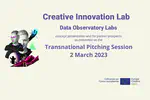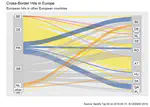Cultural & Creative Sectors and Industries Observatory
Automated data observatory
IViR
Reprex
Zenodo Open Science Repository
rOpenGov
Yes!Delft AI+Blockchain Validation Lab
The creative and cultural sectors and industries are mainly made of networks of freelancers and microenterprises, with very few medium-sized companies. Their economic performance, problems, and innovation capacities are hidden. Our open collaboration to create this data observatory is committed to change this. Relying on modern data science, the re-use of open governmental data, open science data, and novel harmonized data collection we aim to fill in the gaps left in the official statistics of the European Union.
Download our short introduction.
We believe that introducing Open Policy Analysis standards with open data, open-source software and research automation can help better understanding how
creative people and their enterprises and institutions add value to the European economy, how they create jobs, innovate, and increase the well-being of a diverse European society. Our collaboration is open for individuals, citizens scientists. Institutions can join as partners to the Consortium that maintains our observatory.
Get involved in services: our ongoing projects, team of contributors, open-source libraries and use our data for publications. See some use cases.
Follow news about us.
Contact us .
Latest News

Creating a more flexible and useful business and occupational categorisations for the music and film industries.

The latest Reprex R package, dataset was released today on the Comprehensive R Archive Network. It is a very early, conceptual package that will help make scientific achievements more open, governmental data easier to find, and store information that can be better combined.

Reprex won the Audience Prize in The Hague Innovators Challenge - with about as many votes as the 7 other contenters combined. We really wanted to prove that big data can work for small organizations, too.

Our curators help us vocalize the needs of their domain, be it detecting gender biases of recommending engines, audience data on cultural heritage, or detecting evidence of greenwashing, and evaluates if the data that we come up with is directly usable and actionable.
Applications
Accomplishments
Pillars
Recent Posts
Projects
Recent & Upcoming Talks
More formal events than our meetups with a set agenda
Featured Publications

The lacking strategy to organize data and metadata in a multilingual Europe puts creators opens up the biggest cultural market of the world to American competition.

Why are the total market shares of Slovak music relatively low both on the domestic and the foreign markets? How can we measure the market share of the Slovak music in the domestic and foreign markets? We offer some answers and solution based on empirical research and with the creation of a database and an AI application.

Our paper argues that fair competition in music streaming is restricted by the nature of the remuneration arrangements between creators and the streaming platforms, the role of playlists, and the strong negotiating power of the major labels. It concludes that urgent consideration should be given to a user-centric payment system, as well as greater transparency of the factors underpinning playlist creation and of negotiated agreements.

The topic of the paper is Library Genesis (LG), the biggest piratical scholarly library on the internet, which provides copyright infringing access to more than 2.5 million scientific monographs, edited volumes, and textbooks. The paper uses advanced statistical methods to explain why researchers around the globe use copyright infringing knowledge resources. The analysis is based on a huge usage dataset from LG, as well as data from the World Bank, Eurostat, and Eurobarometer, to identify the role of macroeconomic factors, such as R&D and higher education spending, GDP, researcher density in scholarly copyright infringing activities.

The results of the first Hungarian, Slovak, Croatian and Czech music industry reports are compared with Armenian, Austrian, Bulgarian, Lithuanian, Serbian and Slovenian data and findings.

Slovakia’s first music industry report. Following the three income streams model from creation till audience, we summarized for the the number of works that were created, recorded, staged in Slovakia in a year. We calculated their revenues, their value added, their employment effect and the investments of the recording industry. There is an extensive business development and policy conclusions chapter in the 227-pages report, which follows a similar Hungarian report.

Being visible in the world is always difficult in the Central and Eastern European region. Made in Hungary is the first book in the Popular Music Studies series of Routledge from the region. A description of our first datasets, the motivation of the research and the CEEMID concept is laid out as a closing, quantitative chapter in the book.
Software Releases

Publish your datasets with FAIR metadata in open science repositories and place them on knowledge graphs

The goal of retroharmonize is to facilitate retrospective (ex-post) harmonization of data, particularly survey data, in a reproducible manner.

The goal of retroharmonize is to facilitate retrospective (ex-post) harmonization of data, particularly survey data, in a reproducible manner.
Recent Publications
Contact
You can also contact as personally on public talks and meetups.
- The Hague, Zuid-Holland
- Book an appointment
- DM Me


















































